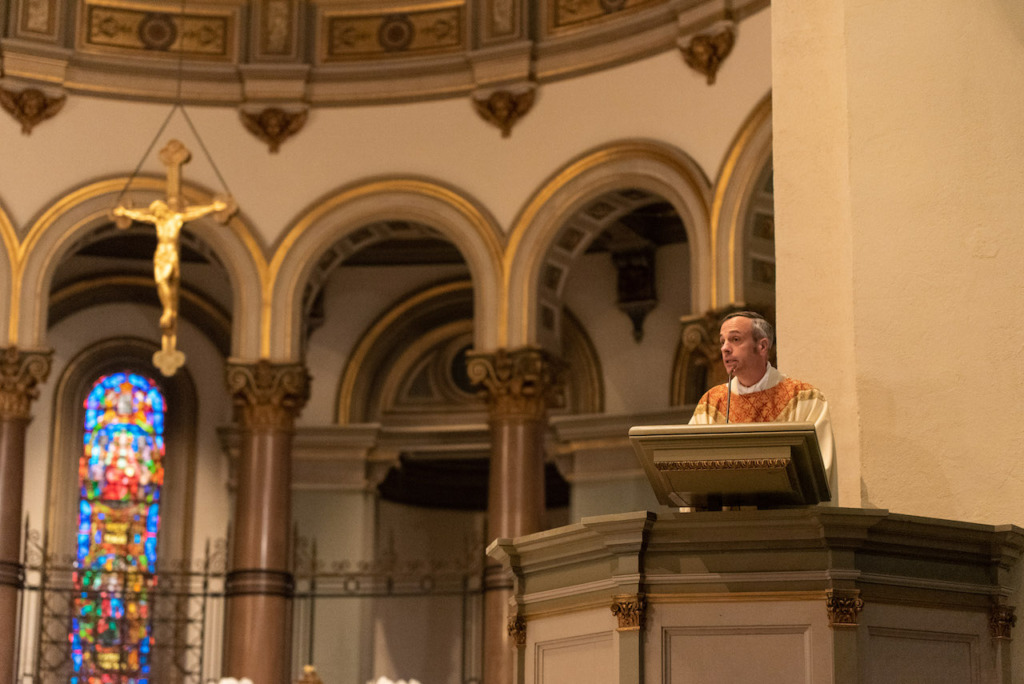Question: The priest who helped with my conversion said that when we arrive before Mass we should be respectful to the people around us – to pray and sit quietly until Mass begins. Has the process changed or are we still asked to be quiet? In my church people speak very loud before Mass and the priest is the biggest offender.
Answer: Courtesy and common sense strongly suggest keeping a reverent, silent atmosphere in church. Our church buildings are meant to be sacred spaces where people can come to be in the presence of God in an especially focused way. Before Mass the faithful are encouraged to recollect themselves in preparation for Mass. After the dismissal people often stay, to extend their time of thanksgiving after receiving the Eucharist.
If we find ourselves occasion- ally bothered or distracted by other people’s talking in church, sometimes the best thing to do is to recall the “little way” of St. Therese of Lisieux and use the noise as an opportunity to grow in patience and charity. For instance, we might try to assume that the “offending” priest was aiming to cheer up a lonely parishioner who is going through a challenging time.
Question: Can I leave Mass after the blessing, or must I wait for the recessional hymn to be sung? (Syosset, New York)
Answer: The final blessing is the official conclusion of the Mass, so – in that sense – once the final blessing is said, Mass is over and you may leave without technically missing any of the Mass.
However, as the “General Instruction of the Roman Missal” says: “The Christian faithful who come together as one in expectation of the Lord’s coming are instructed by the Apostle Paul to sing together Psalms, hymns and spiritual canticles (cf. Col 3:16)” (GIRM 39). And, as the popular expression (sometimes attributed to St. Augustine) goes, “he who sings prays twice.” So, if you’re not on a tight schedule, you might consider staying for the recessional hymn – not out of a sense of obligation, but simply for your own spiritual joy and communal nourishment.
Question: What happened to Limbo? (Sacramento, California)
Answer: Traditionally, limbo was thought of as a “place” in the afterlife that was neither heaven nor purgatory, but which also didn’t involve the full sufferings of hell proper. Limbo was meant for the non-baptized who were innocent of any serious personal sin. Generally, limbo was seen as the destiny of young children who died before baptism, and in some cases also as the eternal home of virtuous non-Christians.
The idea of limbo was a sort of compromise between the Church’s teachings on the necessity of baptism for salvation, the reality of original sin, and our belief in God’s justice and mercy. It was posited that while God would never condemn the innocent to suffer eternal torment, the unbaptized could never enter heaven itself.
However, limbo was never official Church doctrine; it was always only a well-established but still speculative theological theory. Limbo is not included in our Creeds and is never mentioned in our current Catechism of the Catholic Church.
Our liturgical tradition also at times contradicts the concept of limbo for unbaptized infants. For instance, we celebrate the feast of the Holy Innocents every year on December 28, recognizing that these unbaptized babies who died for the sake of Christ can intercede for us from their home in heaven. The Church also has special rites for the funeral Mass of infants who die before baptism.
In more recent times, the International Theological Commission – a body of professional theologians who convene regularly to study various issues and advise the Pope – addressed the question of limbo in a document published in 2007. They note that while baptism is a necessary component to our faith, “The necessity of sacramental Baptism is a necessity of the second order compared to the absolute necessity of God’s saving act through Jesus Christ for the final salvation of every human being.” And that “Sacramental Baptism is necessary because it is the ‘ordinary’ [my emphasis] means through which a person shares the beneficial effects of Jesus’ death and resurrection.”
That is, while baptism is the usual and ordinary means through which a person is able to attain eternal life in heaven, the Church still recognizes that God is free to extend his saving grace in an extraordinary way, beyond his promises. The overall conclusion of this document from the Commission is that, with respect to the eternal fate of unbaptized infants, we can have confidence in God’s tender mercy.
Jenna Marie Cooper, who holds a licentiate in canon law, is a consecrated virgin and a canonist whose column appears weekly at OSV News. Send your questions to [email protected].

